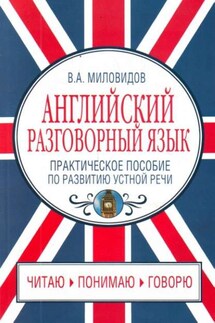Английский разговорный язык. Практическое пособие по развитию устной речи - страница 7
Like a true capitalist, the farmer threw his hands in the air and answered, «Hey! I give 15 Roubles to the chickens. They can eat whatever they want!»
Buy Machine for a Socialist Factory
An American manufacturer is showing his machine factory to a potential customer from The Soviet Union. At noon, when the lunch whistle blows, two thousand men and women immediately stop work and leave the building.
«Your workers, they're escaping!» cries the visitor. «You've got to stop them.»
«Don't worry, they'll be back,» says the American. And indeed, at exactly one o'clock the whistle blows again, and all the workers return from their break.
When the tour is over, the manufacturer turns to his guest and says, «Well, now, which of these machines would you like to order?»
«Forget the machines,» says the visitor. «How much do you want for that whistle?»
allocate – распределять, размещать
blow – дуть, гудеть, свистеть
encharge – давать задание
escape – спасаться, убегать
potential – потенциальный
whatever – что бы ни, какие бы ни
whistle – свисток, гудок
amount of feed – количество корма
be in effect – быть в действии
machine factory – машиностроительный завод
lunch whistle – гудок на обеденный перерыв
Exercise 5
Answer the questions:
1. What was the inspector encharged with?
2. What type of an economic system was still in effect in Russia in the days of the inspector's visit to the farm?
3. How did the first farmer spend 15 roubles given to him?
4. Why was the second farmer imprisoned?
5. What would you do if you were a chicken given 15 roubles to?
6. What factory was the American manufacturer showing to a potential customer from the Soviet Union?
7. How many people worked at this factory?
8. Why did the Soviet customer think that the workers were escaping?
9. Why did the workers come back?
10. Why did the customer want to buy the whistle, and not the machines?
Fascism
The word «fascism» comes from the Latin fasces, and means a bundle of rods with an axe in it. In economics, fascism is viewed upon as a third way between free trade capitalism and communism. Private property and the profit motive are quite welcome within fascist economy if they do not conflict with the interests of the state.
The classical expample of fascism in economics was Italy in the days of Mussolini, where it grew out of syndicalism and nationalism. The syndicalists supposed that economy ought to be governed by groups representing various industries. The nationalists put forward the idea of national struggle. Italy was a proletarian nation suffering from the unfavourable results of World War I, they said, and to win a greater share of the world's wealth, all of Italy's classes must unite. Mussolini was a syndicalist who turned nationalist during World War I.
In Mussolini's Corporative State all economic decisions were made by councils composed of workers and employers who represented different trades, and who were supposed to resolve all the conflicts between classes and industries. These counsels aimed at preventing the class struggle from undermining the national struggle. All the economic life was supervised by the government.
After Mussolini became dictator in 1925, he began a program of massive deficit spending, public works, and eventually, militarism.
Preparing for the coming war, Mussolini extensively used protectionist measures to turn the economy toward economic self-sufficiency. Government bureaus had to purchase Italian products only, and increased tariffs on imports were introduced in 1931, along with high import quotas, and embargo on industrial goods.


